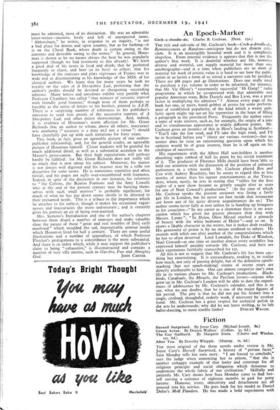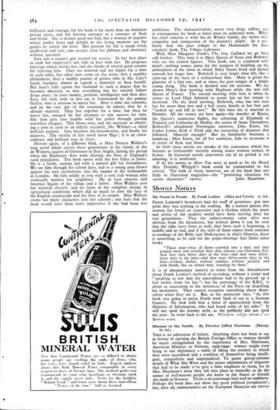Fiction
Herself Surprised. By Joyce Cary. (Michael Joseph. 8s.) Green Acres. By Doreen Wallace. (Coffins. gs. 6d.) The Gay Gaillard. By Margaret Irwin. (Chatto and Windus.
zos. 6d.) After Tea. By Dorothy Whipple. (Murray. 7s. 6d.)
THE most original of the three novels under review is Mr. Joyce Cary's Herself Surprised, a history of " private faces." Sara Monday tells her own story. " I am forced to conclude," says the judge when sentencing her to prison, " that she is another unhappy example of that laxity and contempt for all religious principle and social obligation which threatens to undermine the whole fabric of our civilisation." Skilfully and patiently Mr. Cary shows how Sara Monday came to find her- self serving a sentence of eighteen months in gaol for petty larceny. Humour, irony, objectivity and detachment are all pressed into his service. He goes back for his model to Daniel Defoe's Moll Flanders. He has made a bold experiment with
brilliance and courage, for his book is far more than an imitation period piece, and his heroine emerges as a creature of flesh and blood. She is neither good nor bad, but a woman of impulse whose tender heart and delight in the living moment are the guides by which she lives. Her passion for life is made vivid, unaffected and real ; one accepts even her glibness and obstinacy without question.
Sara was a country girl trained for service. In her first place as cook her employer's son falls in love with her. He proposes marriage which shocks her, and she thinks of several good reasons for rejecting him. They are married and are happy for a time in each other, but other men come on the scene, first a wealthy philanderer, then a shabby painter of genius who in Mr. Cary's hands becomes almost as superb a character as Sara herself. But Sara's folly upsets her husband to such a degree that he becomes obsessed, so that everything but his marital failure drops away ; he loses money, position, intelligence and then dies. Sara, left with little to live on, is importuned by the painter Gulley, who is anxious to marry her. After a time she consents, and on the very day of the ceremony he admits that he is already married. They live together for a time, but then he leaves her, enraged by her attempts to win success for him. She then gets into trouble with the police through passing worthless cheques. This blows over, and she succeeds in obtain- ing a post as cook to an elderly eccentric, Mr. Wilcher—a third brilliant portrait. Sara becomes his housekeeper, and finally his mistress. The vitality of this novel never flags ; it is an extra- ordinary and brilliant tour de force.
History again, of a different kind, is Miss Doreen Wallace's long novel which covers three generations in the family of the de Winters, squires of Greenacre in East Anglia, during the period when the Enclosure Acts were altering the lives of England's rural population. The book opens with the boy Giles at home. He is a lively, curious lad with a natural gift for friendliness. We see him through his school days, and as a young man drawn against his own inclinations into the haunts of the fashionable in London. He falls wildly in love with a very rich woman who eventually marries his neighbour. He in turn marries and becomes Squire of the village and a father. Miss Wallace uses her material cleverly, and we learn of the complete change in agricultural conditions which did so much to alter the face of the English countryside and the lives of its people. Miss Wallace crams too many characters into her scheme ; one feels that the book would have been more impressive if she had been less
ambitious. The characterisation, never very deep, suffers, and in consequence the book at times loses its authentic note. Whil?, her chief concern is with the de- Winter family, she writes with sympathy and compassion of the peasant's plight. In a pre- fatory note she pays tribute to the Hammonds for their scholarly book, The Village Labourer.
With Miss Margaret Irwin's The Gay Gaillard we go back still further. This time it is Mary Queen of Scots and Bothwell who are the central figures. This book, too, is crammed with detail ; nothing comes amiss for the purpose of building up the atmosphere of the times in which Mary Stuart lived and moved towards her tragic fate. Bothwell is seen larger than life, like a close-up of the hero of a technicolour film. Mary is given the glamour of a filni star, and at times the pert tongue of a bright young thing. The book is divided into six sections. We are shown Mary's first meeting with Hepburn while she was still Queen of France. The second meeting with him is when he comes as Lord High Admiral to escort her on her return to Scotland. On the third meeting, Bothwell, who has not seen her for more than two and a half years, kneels at her feet and " looked up and fell in love." By this time she is married to Darnley. All the scenes are here again—the murder of Rizzio, the Queen's numerous flights, the scheming of Elizabeth of England and Catherine de Medici, the snares of Anna Throndsen, Bothwell's abandoned Norwegian mistress, John Knox, the Casket Letter, Kirk o' Field and the succession of disasters that followed. Material enough? But its familiarity becomes a handicap ; Miss Irwin, for all her ambition, fails to re-create it in terms of flesh and blood.'
In both these novels are streaks of the coarseness which has become so fashionable recently among many women writers of fiction. In historical novels coarseness out of its period is not amusing, it is irrelevant.
If all the stories in After Tea were as good as In the Hotel, Mrs. Dorothy Whipple's book could be commended to the critical. The bulk of them, however, are of the kind that one finds in illustrated magazines—the " promising situations for























 Previous page
Previous page